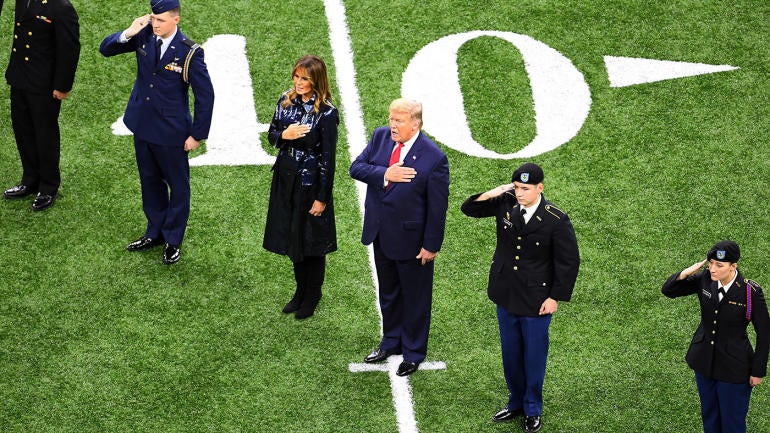
The Big Ten refuted a White House claim Wednesday that President Donald Trump influenced the conference's return to play its college football season this fall.
The Big Ten announced it will begin a nine-week season on Oct. 23-4. The decision was based on the availability of new, safer, more frequent rapid testing for COVID-19, the conference said.
Trump sent a tweet shortly after the Big Ten made its announcement, and the White House followed up with a conference call in which a White House administrator said Trump is "honored and humbled he was able to make a difference in this."
Great News: BIG TEN FOOTBALL IS BACK. All teams to participate. Thank you to the players, coaches, parents, and all school representatives. Have a FANTASTIC SEASON! It is my great honor to have helped!!!
— Donald J. Trump (@realDonaldTrump) September 16, 2020
However, a Big Ten source with direct knowledge of the situation told CBS Sports the Big Ten neither requested nor ultimately received help from the federal government to aid their return to play.
A Big Ten university president flatly denied the White House's claims to NBC News.
"President Trump had nothing to do with our decision and did not impact the deliberations," that school president told NBC's Peter Alexander. "In fact, when his name came up, it was a negative because no one wanted this to be political."
The White House did not immediately respond to CBS Sports' request for comment on the Big Ten's assertion.
Big Ten commissioner Kevin Warren and Trump spoke briefly on a Sept. 1 call reportedly arranged by a national sports commentator and talk show host. Trump later tweeted the conference was "on the one-yard line" in its hopes to return to play.
Had a very productive conversation with Kevin Warren, Commissioner of the Big Ten Conference, about immediately starting up Big Ten football. Would be good (great!) for everyone - Players, Fans, Country. On the one yard line!
— Donald J. Trump (@realDonaldTrump) September 1, 2020
The White House claimed Wednesday that, since the Sept. 1 call, "there have been over 300 calls between the White House, players, parents, coaches, athletic directors and Big Ten officials lending resources, time information, doing everything we possibly can to give the Big Ten a path forward."
Within 48 hours of that call, the White House claims Trump "had what the Big Ten was asking for" to be able to play.
When asked during a media conference call whether the Big Ten would use federal resources if offered, that White House administrator said it was up to the Big Ten to answer that question.
"We believe, after seeing this from our perspective, that had the president not been as responsive as quick as he was and not offered the testing capability we would not be here today talking about that," the White House administrator said.
USA Today's Dan Wolken reported that the extent of the president's involvement was that singular Sept. 1 phone call.
"I would say it was one pretty important phone call," the White House administrator said. "But there were hundreds of follow up phone calls aside from that."
Some Big Ten coaches, parents and players had protested the conference's decision to postpone the 2020 college football season on Aug. 11.
In making its Wednesday announcement, the conference cited in detail how newly available daily testing of players would reduce the risk of COVID-19.
The president did not call the Mountain West, according to the White House. That conference, along with the Pac-12 and MAC, are attempting to play in 2021. That was the Big Ten's plan before Wednesday. The Pac-12 recently made an agreement or daily, rapid COVID-19 testing that could get it on the field before the end of 2020.
The White House official was asked if Trump spoke to the Big Ten in an effort to gain favor in key swing states that are in the conference's footprint.
"The president wants everybody to reopen," he said. "This is not just a matter of the Big Ten or the Pac-12 or the Mountain West. He is willing to provide resources to anybody reconsidering playing football. … This is certainly not a political thing."
















